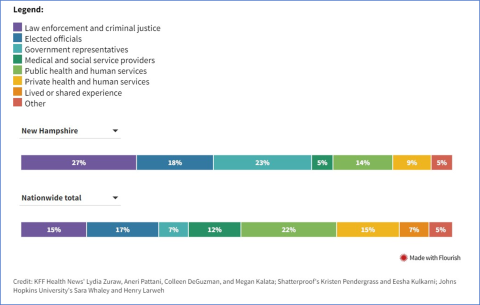Lived Experience and Opioid Settlement Funds
Did you know?

New Hampshire is a party to a series of lawsuits against companies that have made, sold, or distributed opioid painkillers, resolving allegations that the hundreds of thousands of lives lost to opioid overdose across the country were the direct results of the intensive marketing and lack of oversight regarding opioid prescriptions. Major pharmacy chains such as CVS, Walgreens, and Walmart, and several pharmaceutical distributors were included in the lawsuits and settlements. The state also negotiated a separate settlement with Johnson & Johnson, another producer of opioid painkillers. According to New Hampshire's Department of Justice, the state ultimately is expected to receive $115 million dollars over 18 years from opioid settlement funds. Press reports indicate the amount could be as much as $300 million.
Here is the latest
Across the Nation, concerns are rising regarding the utilization of opioid settlement money. While the settlement money presents an opportunity to invest in life-saving services that fight against the on-going opioid crisis, many are worried that the money is not being spent appropriately. Mendocino County in rural California, a county with the highest rate of overdose deaths in the state, is an example of the tension around this issue. Mendocino County’s board of supervisors recently used settlement funds to support filling a budget shortfall. The money was utilized to cover employee health insurance premiums, cost-of living adjustments, and wage increases.
In New Hampshire, the allocation of funds is in the hands of New Hampshire’s Opioid Abatement Advisory Committee. Panel members include local officials, lawmakers, and individuals in fields such as public health, law enforcement, addiction treatment, and corrections. One important group of stakeholders are missing from this committee —the voices of those with lived experience, which is noted as an effective way to improve outcomes in substance use disorder initiatives.
In mid-July, Kaiser Family Foundation (KFF) released a report detailing the membership of opioid fund committees by state, including the ratio of members by the role each member plays in the state.

Notably, New Hampshire’s council does not include anyone with lived experience. In comparison, Maryland, South Carolina, and Vermont each have a committee that is represented by at least 20% of its members being individuals with lived experience. Nationally, 7% of opioid settlement committee membership is made up of people with lived experience.
What does this mean for New Hampshire?
At a time when the overdose rate continues to climb in New Hampshire, the decisions about how these opioid settlement funds are spent remain significant. Last year, New Hampshire reported 480 individuals lost to overdoses—the highest the state has seen since 2017. New Hampshire should prioritize including people with lived experience in the process of deciding how to utilize these funds in order to make the most effective use of these vital resources.